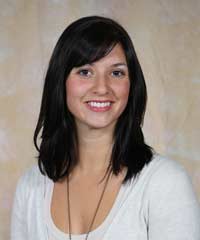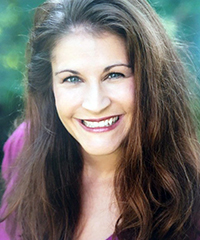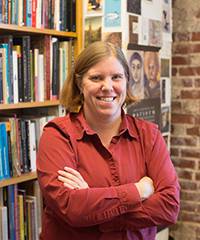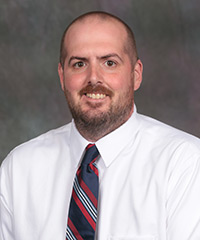RCASH Research Symposium
The Judith Enyeart Reynolds College of Arts, Social Sciences and Humanities celebrates faculty research through its ongoing research symposium. The program aims to establish a forum for interdisciplinary connections among the community.
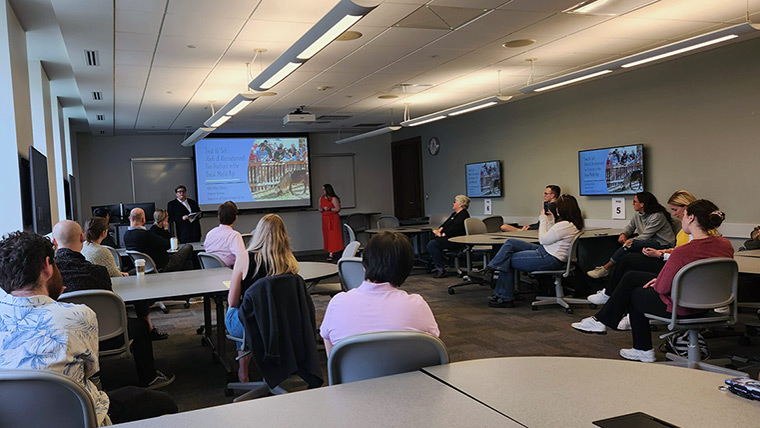
Throughout the academic year, presentations will explore a variety of topics through a blend of lecture, media and discussion.
An Invitation to the Graphic Essay: Cartooning as a Medium in Creative Nonfiction and Beyond
The medium of graphic nonfiction has long been used to examine topics ranging from climate change and political conflicts to the epidemic of loneliness. Assistant Professor Jennifer Murvin will share about the exciting possibilities of graphic essay writing, important literary contexts, and her own original creative work in this narrative mode. She will also discuss pedagogical approaches in teaching the graphic essay and show examples of published student work.
East Wing Songs: History through Art Song
The East Wing Songs project seeks to humanize the first ladies of the United States through song and to use music to share their stories and memorialize their achievements and challenges as women. Art song is the marriage of the written word, then elevated by a musical setting. The inspiration was taken from Jake Heggie’s set, Iconic Legacies: First Ladies at the Smithsonian. His set addresses objects at the Smithsonian for Eleanor Roosevelt, Mary Todd Lincoln, Jacqueline Kennedy, and Barbara Bush. With the support of a Missouri State University Faculty Research Grant, Dr. Daehn commissioned composer Leanna Kirchoff to write songs for Martha Washington, Margaret Taylor, Ida McKinley, Frances Cleveland, and Rosalynn Carter. Texts have been adapted from primary sources including letters, speeches, published writings, interviews and diaries. For women who were more reclusive, or destroyed their correspondence and personal effects, we created a “historical fiction” dialogue as the text based on what we know from first-hand accounts of the women as witnessed by their families, friends, president spouses, and the staff of the White House. Volume 2 had its world premiere in October of 2023 and was written by Linda Lister and included songs for Louisa Adams, Lady Bird Johnson, Ellen and Edith Wilson, Hillary Clinton, & Michelle Obama. The lecture recital format provides context to the music and the poetry. Through the lecture, the songs and words take on a greater power and connect more deeply on a personal level with listeners of all ages.
Dr. Gabriel Ondetti
Professor, Political Science and Philosophy
Jan. 25, 2024
12:15-1:15 p.m.
Siceluff Hall,
Room 126
Threats to Private Property and the Development of Tax Systems in Latin America
Tax revenues have risen robustly across Latin America in recent decades, casting doubt on the region’s longstanding reputation for having states too poor to finance economic and social development. However, dramatic differences persist in the magnitude of national tax burdens, even among seemingly similar countries. Based on my book Property Threats and the Politics of Anti-Statism: The Historical Roots of Contemporary Tax Systems in Latin America, this talk will examine the causes of these differences. It will emphasize the lasting impact of historical episodes of redistributive reform that threatened private property rights. Ironically, where such episodes were most extensive, they hindered future taxation by prompting economic elites and social conservatives to mobilize politically against state intervention in the economy, forming business associations, rightwing parties, and pro-market think tanks. Bound together by a common ideology and collective identity, these antistatist actors have proven to be remarkably enduring and effective in limiting the growth of tax revenues. In contrast, where property threats have been milder, antistatist political coalitions have remained relatively weak and taxation has eventually reached a higher level. The talk will develop this argument theoretically and illustrate it with reference to Argentina, Brazil, Chile, and Mexico. It will close with a brief discussion of how I am currently extending this project to further explore the determinants and implications of public sector size in Latin America.
Dr. Kyle A. Thomas
Assistant Professor, Theatre and Dance
Feb. 22, 2024
12:15-1:15 p.m.
Siceluff Hall,
Room 126
Ludic Communities: Toward a New History of Theatre in the Early Middle Ages
The historical narrative of theatre in the Western World often neglects the roughly one-thousand-year period known as the Middle Ages. Such a narrative presupposes the historiographical conditions of the so-called Dark Ages; that theatre was virtually non-existent and drama reduced to allegory, liturgical musings, or mere Bible stories. Rather, theatre and drama were undergoing some of the most significant cultural and dramaturgical shifts since their inception at the height of the Classical Era. This paper will present new research that identifies monastic communities as centers of dramatic experimentation in the early centuries of the medieval period (roughly 600-1200 CE). From theatrical conceptions of worship that would come to affect the development of the liturgy, to pedagogical dramaturgies employed in cloister schools, to representational practices which attempted to embody the Divine; this paper will capture the new chapter that was opened on the history of theatre in Europe during the early Middle Ages.
Dr. Mitzi Kirkland-Ives
Professor, Art and Design
March 28, 2024
12:15-1:15 p.m.
Siceluff Hall,
Room 126
The Art of the Deal: Painting, Patronage, and International Business in Fifteenth-Century Flanders
In the late medieval era and early Renaissance, Bruges was a commercial capital of northern Europe, serving as a distribution point for goods transported from the Baltic to the eastern Mediterranean and beyond. The communities of merchants and bankers hosted by the city arrived from Florence, Venice, Castile, Biscay, Portugal, and cities of the northern German Hanseatic League like Lübeck, and congregated at its marketplaces, plazas, and at the proto-stock exchange known as the Beurse, and mingled among one another at their nation-houses and the city’s churches, inns, and brothels. This emergent social class of urban entrepreneurs formed the core of Hans Memling's clientele, himself an immigrant from southern Germany who had arrived in the city to pursue a career in the twilight of the Burgundian era. While his predecessors in the city, like Jan van Eyck, had served the ducal court and civic government, Memling's work was commissioned almost exclusively by this merchant class, serving their devotional needs while publicly proclaiming their ambitions in a conspicuously gorgeous manner. Individual cases include the Florentine Tommaso Portinari (branch manager for the Medici bank), the Greverade brothers of Lübeck, the Venetian diplomat Bernardo Bembo, and the Bruges merchant and politician Willem Moreel; these stories feature lapis lazuli imported from Afghanistan and carpets from Armenia, corporate backstabbing, state-sponsored piracy in the North Sea, the imprisonment of the future emperor by artisan guilds, and several decapitations.
Dr. Ethan Amidon
Associate Professor, Criminology and Criminal Justice
April 25, 2024
12:15-1:15 p.m.
Siceluff Hall,
Room 126
An Examination of the County-level Political Considerations Associated with Declining Reliance on the Death Penalty from 1990 to 2010
Theorists have placed considerable emphasis on the role that political factors play in shaping jurisdictional use of the death penalty. However, scholars have yet to empirically examine whether these political explanations account for reliance on this punishment across counties in the United States. Furthermore, empirical research that has examined the political factors associated with the dramatic decline in the use of the death penalty in the late 20th and early 21st centuries has been limited. In order to address these gaps in the literature, this study examines whether the variables derived from three political perspectives are associated with use of death sentences across 2,572 counties in the United States from 1990 to 2010. The results from this study indicate support for the key propositions within the partisan politics, religious fundamentalist sentiment, and economic threat hypotheses. However, in contrast to the results from prior studies, no support was shown for the direct relationship between the size of African American populations and local reliance on the death penalty.
